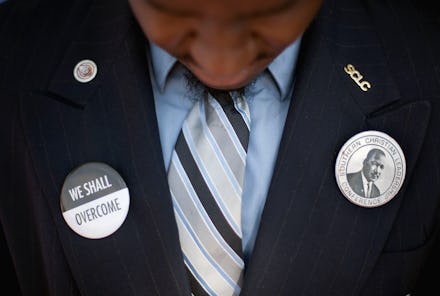You'd Never Believe What Kind Of Economics MLK Believed In

If he was alive today, Martin Luther King, Jr. would not have been a Republican.
In light of the frequency with which he is cited as a hero and role model, that point cannot be reiterated enough. We often hear about King's crusades to end legal segregation in the South and de facto segregation in the North, but far less attention is paid to the inextricable link between his views on civil rights and his philosophy on economic matters.
This needs to be corrected.
We can start with a brilliant document King composed less than two months before he died. Expressing dismay at how "the majority of Negroes [are] locked up in an economic underworld of poverty, joblessness, and unemployment," King spoke for all of America's poor when he proclaimed, "We do not come here to ask for charity. We demand justice."
From there he argued that the federal government owed its citizens "an economic and social Bill of Rights." These would include a guaranteed job for every citizen capable of working, thus eradicating unemployment except for the physically and psychologically debilitated; a guaranteed minimum income (which he emphasized would not be a substitute for the entire welfare state, as many conservatives demanded), one that "should be fixed as to automatically increase along with the cost of living and the rise in the Gross National Product"; the elimination of slums and racialized neighborhoods; full access to quality education for all children; a requirement that all Federal legislation designed to improve the quality of life of citizens ("in education, the labor market, income maintenance, and the like") that a requirement exist "that the people affected by a program be granted a statutory right to play a significant role in how it shall be designed and administered"; and the right to "the full benefits of modern science in health care."
King closed this ambitious manifesto by pre-empting conservative claims that this program would be too expensive by pointing out how its funds could be taken from egregious military ventures like the Vietnam War.
While it's easy for the historically uninformed to mistake King's ideas for socialism, they were in fact consistent with the ideas regularly propounded by the mainstream liberals of his time. Indeed, both the title and substance of King's "Economic Bill of Rights" had been advanced 24 years earlier by the founding father of the modern Democratic Party, Franklin D. Roosevelt, in a passage from his penultimate State of the Union address. For the three decades between Roosevelt's inauguration in 1933 and the nomination of Barry Goldwater as the Republican presidential candidate in 1964, majorities in both parties agreed with the gist of these goals, even if they differed as to the ideal means through which they could be implemented. Goldwater's nomination and the consequent right-wing takeover of the GOP, however, prompted King to distance himself from the political philosophy he saw as nationalistic and bellicose in foreign policy, unconcerned and uncomprehending to the plight of the poor, and — though not always deliberately racist — "gives aid and comfort to the racists."
These are hardly the only instances in which King parted ways with contemporary conservative ideals. He once labeled racism, materialism, and militarism as a "Triumvirate of Evil," arguing that "that the problem of racism, the problem of economic exploitation and the problem of war are all tied together." During his days as a student, King wrote that "any religion which professes to be concerned about the souls of men and is not concerned about the social and economic conditions that scar the soul, is a spiritually moribund religion." His first book, Stride Toward Freedom, advocated "a better distribution of wealth" as a rectificaton for the economic injustices of capitalism, while eight years later he observed to his staff that the biggest obstacle in solving these problems was that "you are messing with captains of industry. Now this means that we are treading in difficult water, because it really means that we are saying that something is wrong with capitalism." Those words may have been prophetic, as King was assassinated shortly after organizing a multiracial "Poor People's Campaign" that would engage in nonviolent civil disobedience in Washington until its politicians guaranteed his aforementioned economic bill of rights. Although the world knows that he was shot in Memphis, it is often forgotten that he was there to support black sanitary workers who were at the time striking for higher wages and better working conditions.
As America observes Martin Luther King Jr. Day, we must be faithful to the full measure of his great legacy. It's far too easy to water down his ideas, focusing on the ones that are widely accepted (like integrationism) and ignoring anything that might offend large segments of the American community (like economic progressivism). Then again, King didn't change the world by only saying what his audience wanted to hear. If we are to do justice to this American hero, we must honor all of his message.